What Does a Dragon Symbolize Spiritually? Strength, Courage!
In various cultures and spiritual beliefs, the dragon symbolizes strength, courage, protection, wisdom, and good fortune.
It often embodies power and primordial energy, and in some traditions, it is seen as a guardian spirit or a guide for personal growth and enlightenment.
The symbolism of the dragon can vary significantly depending on the cultural context:
For example, in Feng Shui, the dragon symbol may be used in a home to attract positive energy and protect against negative forces.
The dragon’s imagery is woven into the spiritual fabric of many cultures, serving as a potent symbol of the human journey towards personal power and enlightenment. Its presence often represents both the challenges and triumphs encountered along the path of self-discovery, embodying transformation, wisdom, and inner strength. Similarly, tiger symbolism in spirituality carries themes of courage, willpower, and the primal energy needed to overcome obstacles. Together, these legendary creatures remind us of the balance between ferocity and grace inherent in our pursuit of higher understanding.
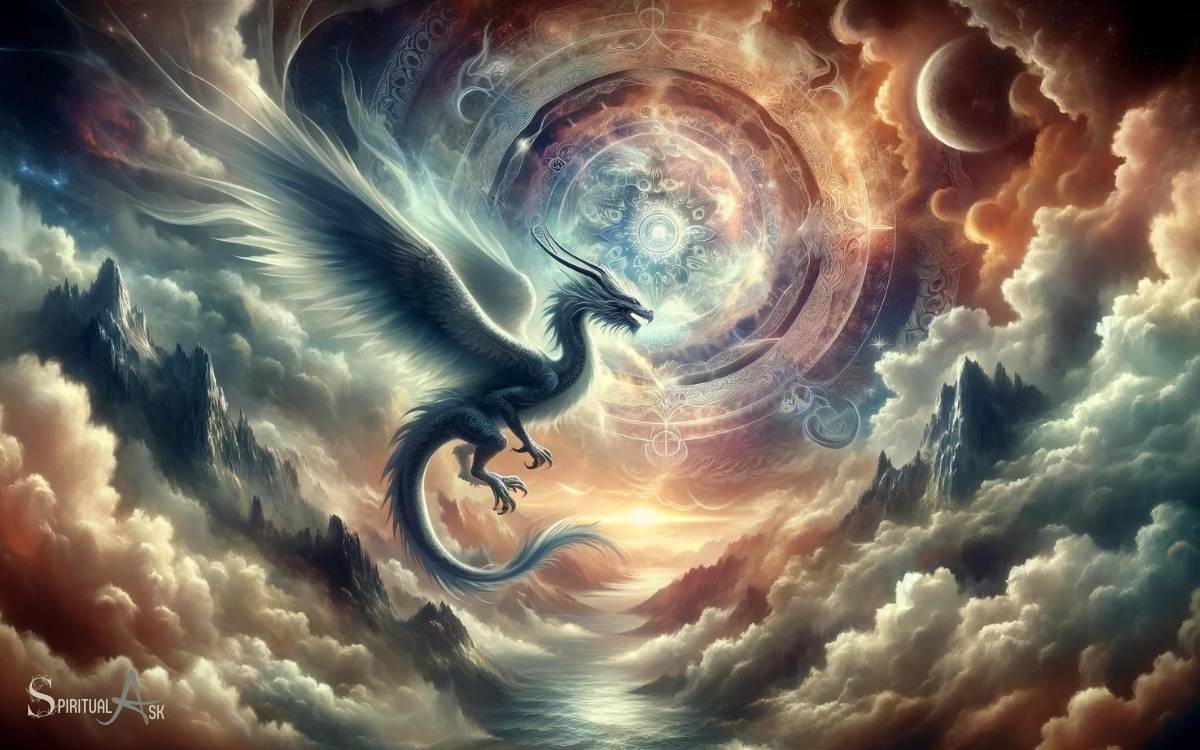
Key Takeaway
The Origins of Dragon Symbolism
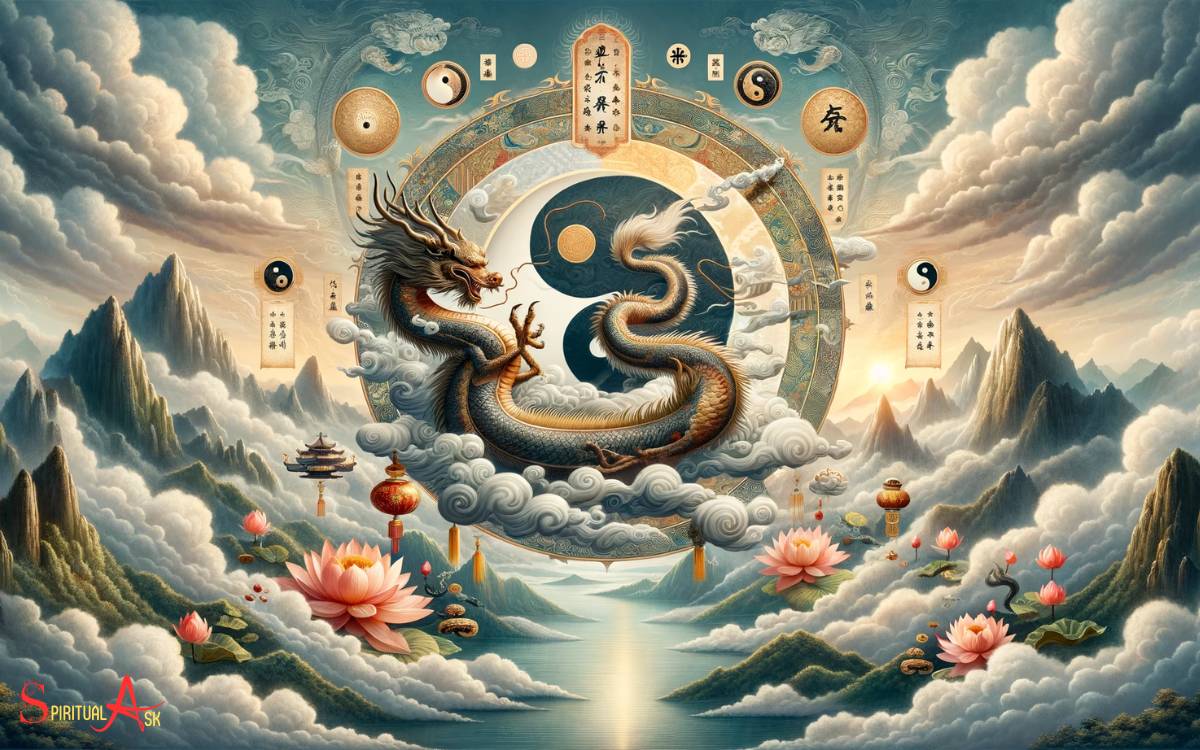
Exploring the origins of dragon symbolism has revealed fascinating insights into ancient cultures and their beliefs.
Dragons have been a part of human mythology for centuries, appearing in the stories of diverse civilizations such as Chinese, European, and Mesoamerican.
The concept of dragons likely originated from the discovery of dinosaur bones, igniting the imagination of ancient peoples. In various cultures, dragons have symbolized different things, such as power, wisdom, and strength.
In Chinese folklore, dragons are revered as benevolent creatures, associated with good fortune and prosperity, while in European tales, they often represent chaos and destruction.
The prevalence of dragon symbolism across civilizations suggests a universal fascination with these mythical creatures and their significance in shaping cultural beliefs and values.
Understanding the origins of dragon symbolism provides a window into the collective human psyche and the timeless allure of these majestic beasts.
Dragons in Eastern Spiritual Traditions
What role do dragons play in Eastern spiritual traditions, and how do they differ from their portrayal in other cultures?
In my opinion, dragons in Eastern spiritual traditions hold a unique significance that is deeply intertwined with the region’s cultural and religious beliefs.
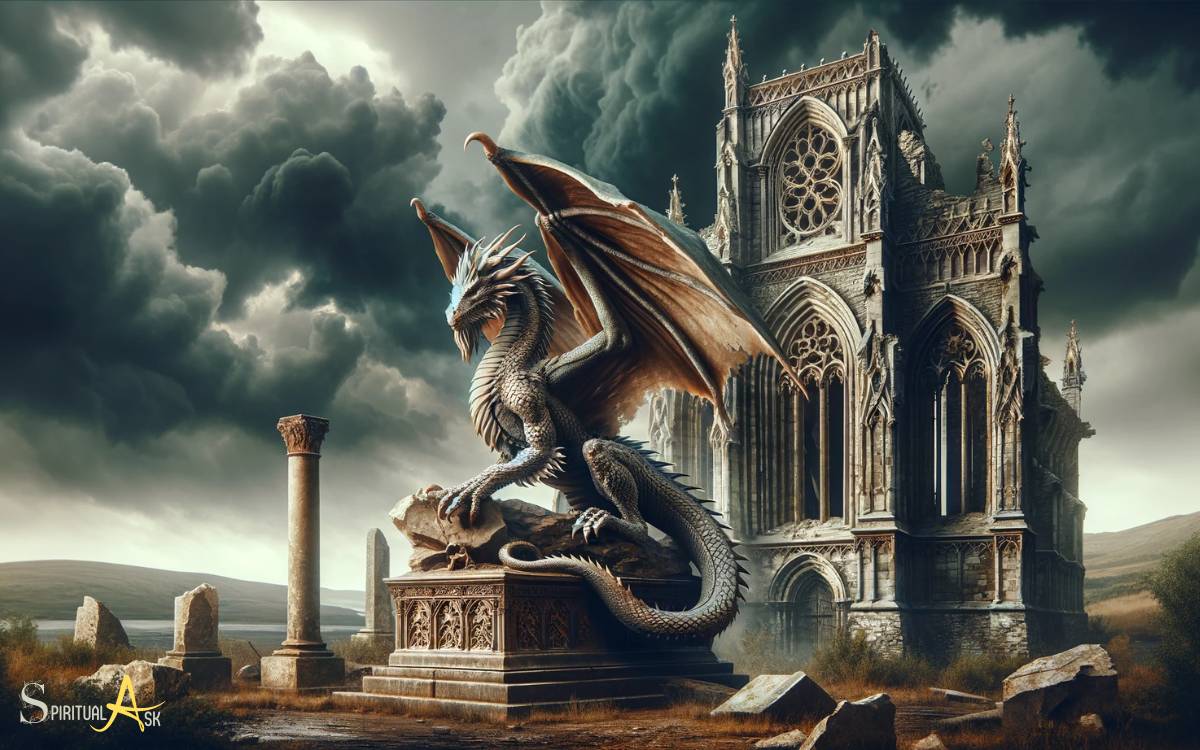
Unlike the often fearsome and malevolent Western portrayal, dragons in Eastern traditions are revered as benevolent, wise, and powerful beings.
In many Eastern cultures, dragons symbolize potent and auspicious energy, associated with water, rainfall, and fertility. They are often seen as guardians and bringers of good fortune.
In Eastern spiritual traditions such as those in China and Japan, dragons are revered as celestial beings and are closely linked to the natural world.
Their portrayal reflects a harmonious and respectful relationship with nature, embodying virtues of strength, wisdom, and prosperity.
Dragons in Western Mythology and Religion
When it comes to Western mythology and religion, dragons are often depicted as powerful and fearsome creatures.
They are commonly associated with divine protection and guidance, serving as symbols of strength and wisdom.
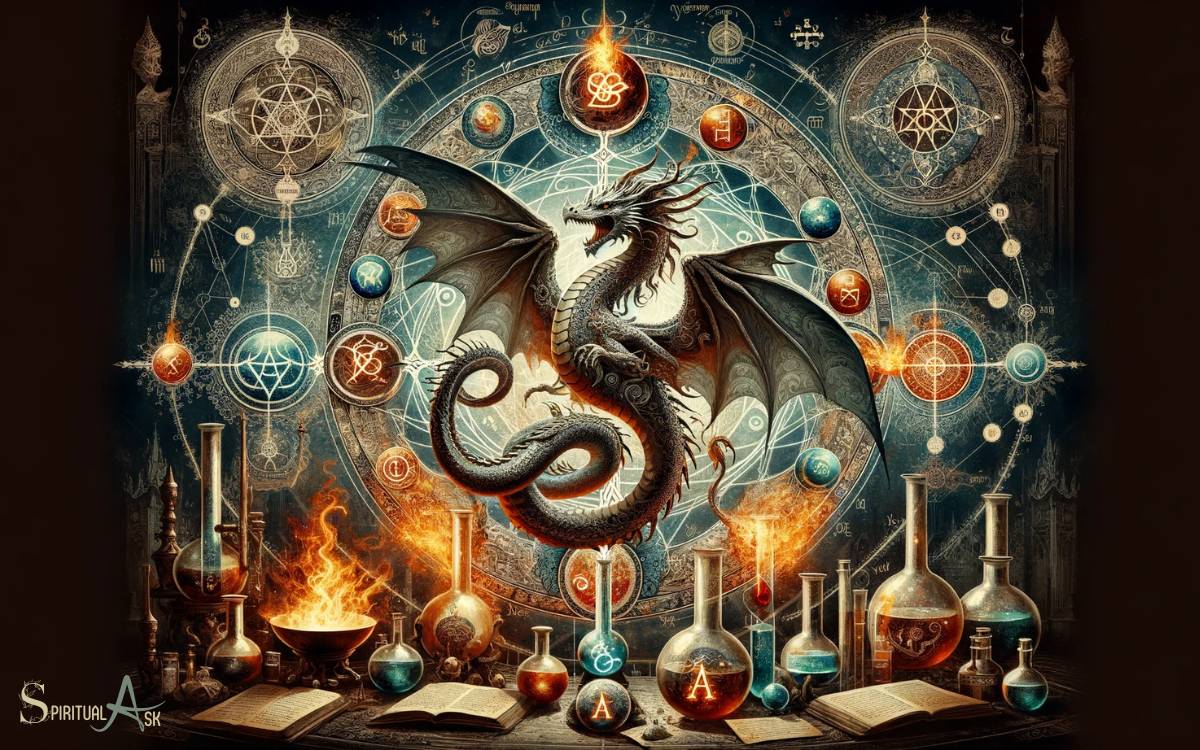
Additionally, dragons are seen as representations of transformation, embodying the idea of change and evolution in various Western spiritual traditions.
Power in Mythology
In Western mythology and religion, the dragon embodies immense power and is often depicted as a formidable force to be reckoned with. Throughout history, dragons have been revered for their strength and dominance.
In Western mythology, dragons are frequently associated with guarding treasure, symbolizing their power and the fear they instilled in people.
In Christianity, the dragon is a symbol of evil and chaos, representing the adversary of God. The story of St. George and the Dragon is a prominent example of the dragon as a representation of malevolent power being overcome by a virtuous hero.
This portrayal of the dragon highlights the belief in the triumph of good over evil. Overall, the dragon’s power in Western mythology and religion serves as a reminder of the eternal struggle between opposing forces.
Divine Protection and Guidance
Experiencing the divine protection and guidance symbolized by dragons in Western mythology and religion is a powerful and enduring aspect of spiritual belief.
In Western culture, dragons are often depicted as guardians, offering both protection and guidance to those they favor.
This representation instills a sense of security and reassurance in believers, serving as a reminder that they are not alone in their journey through life.
The symbolism of dragons as protectors and guides is deeply rooted in the collective consciousness, providing a source of strength and comfort during challenging times.
| Divine Protection | Divine Guidance |
|---|---|
| Offers safety and security | Provides wisdom and direction |
| Instills a sense of reassurance | Assists in navigating life’s challenges |
| Symbolizes strength and resilience | Offers clarity and insight |
Symbol of Transformation
As a spiritual symbol, dragons in Western mythology and religion embody the concept of transformation, representing the profound changes and growth that individuals undergo in their spiritual journey.
In various Western traditions, dragons are often depicted as powerful, majestic creatures capable of both destruction and creation. Their ability to breathe fire and fly symbolizes the inner fire and the soaring spirit within each individual.
Just as a dragon can metamorphose from a hatchling into a colossal being, so too can humans undergo profound inner changes and personal growth.
This symbolism serves as a reminder that transformation is a natural part of life and that embracing change is essential for spiritual evolution.
Understanding the symbolism of dragons in Western mythology and religion provides insight into the broader significance of these mythical creatures in various cultural contexts. This understanding lays the groundwork for exploring their symbolism in alchemy.
The Symbolism of Dragons in Alchemy
I’ve always been fascinated by the symbolism of dragons in alchemy. Their representation as a transformative force and their alchemical significance have intrigued scholars and practitioners for centuries.
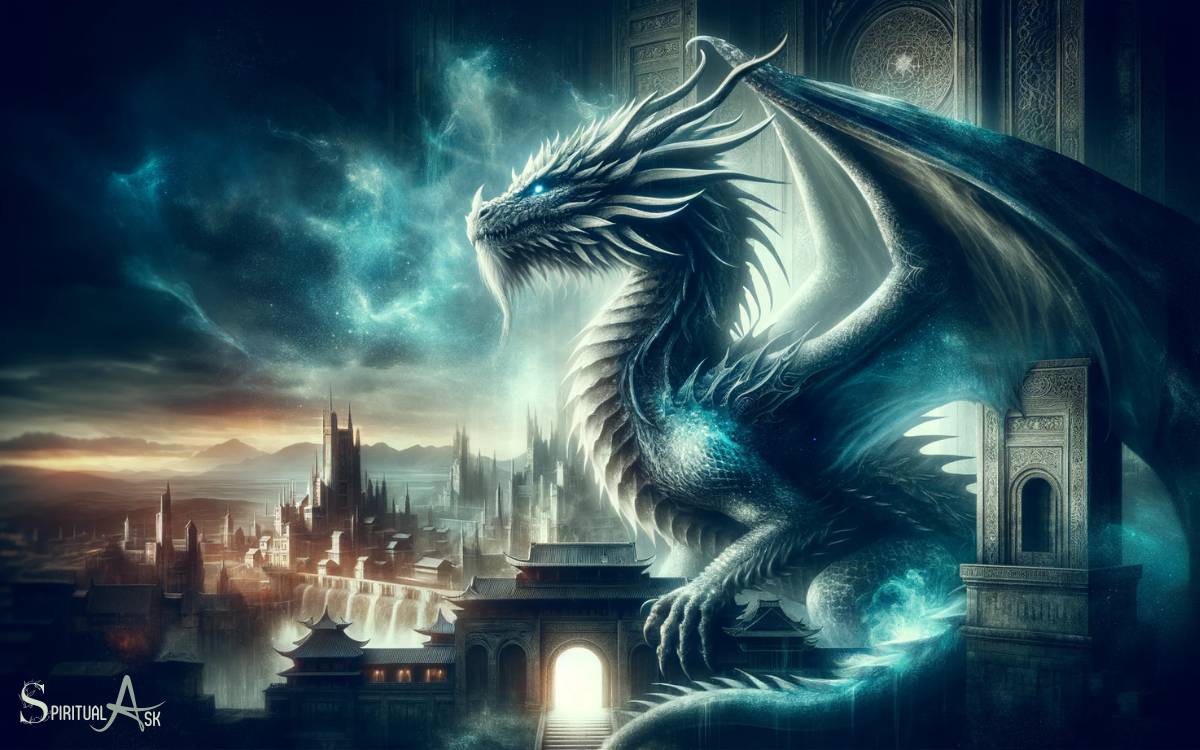
Exploring how dragons are portrayed in alchemical texts and their role in the process of transformation sheds light on the deeper spiritual meanings associated with these mythical creatures.
Dragon as Transformative Force
The dragon symbolizes a transformative force in alchemy, representing the process of profound change and transmutation.
In alchemical symbolism, the dragon embodies the following key aspects:
- Rebirth: The dragon’s ability to shed its skin and emerge renewed represents the concept of rebirth and regeneration in the alchemical journey.
- Union of Opposites: The dragon’s dual nature, often depicted as both benevolent and destructive, mirrors the alchemical union of opposing forces to achieve transformation.
- Transcendence: By conquering the dragon, alchemists sought to transcend the limitations of the material world and ascend to higher spiritual realms.
- Prima Materia: The dragon guarding a treasure or a potent substance symbolizes the quest for the elusive prima materia, the fundamental element essential for transmutation.
- Inner Work: The dragon’s presence as a formidable obstacle signifies the inner challenges and struggles faced in the pursuit of spiritual evolution.
Alchemical Significance of Dragons
Delving further into the alchemical significance of dragons, my exploration uncovers their profound symbolism in the pursuit of spiritual enlightenment. In alchemy, dragons represent the volatile forces of nature and the raw, primal energies that drive transformation.
They symbolize the chaotic and untamed aspects of the human psyche that must be acknowledged and integrated to achieve inner balance and self-realization.
The dragon’s ability to transmute base metals into gold mirrors the alchemical process of inner transformation, where the seeker strives to transmute their lower, ego-driven nature into spiritual gold, symbolizing enlightenment and transcendence.
Additionally, dragons are often depicted guarding valuable treasures, representing the inner riches and wisdom that can only be attained through confronting and understanding the formidable aspects of the self.
In alchemy, the dragon serves as a powerful metaphor for the arduous yet rewarding journey towards spiritual evolution.
Dragons as Guardians and Protectors
When it comes to spiritual symbolism, I’m drawn to the idea of dragons as powerful guardians and protectors. In many cultures, dragons are revered as symbols of protection and are believed to possess the strength to safeguard against evil and negativity.
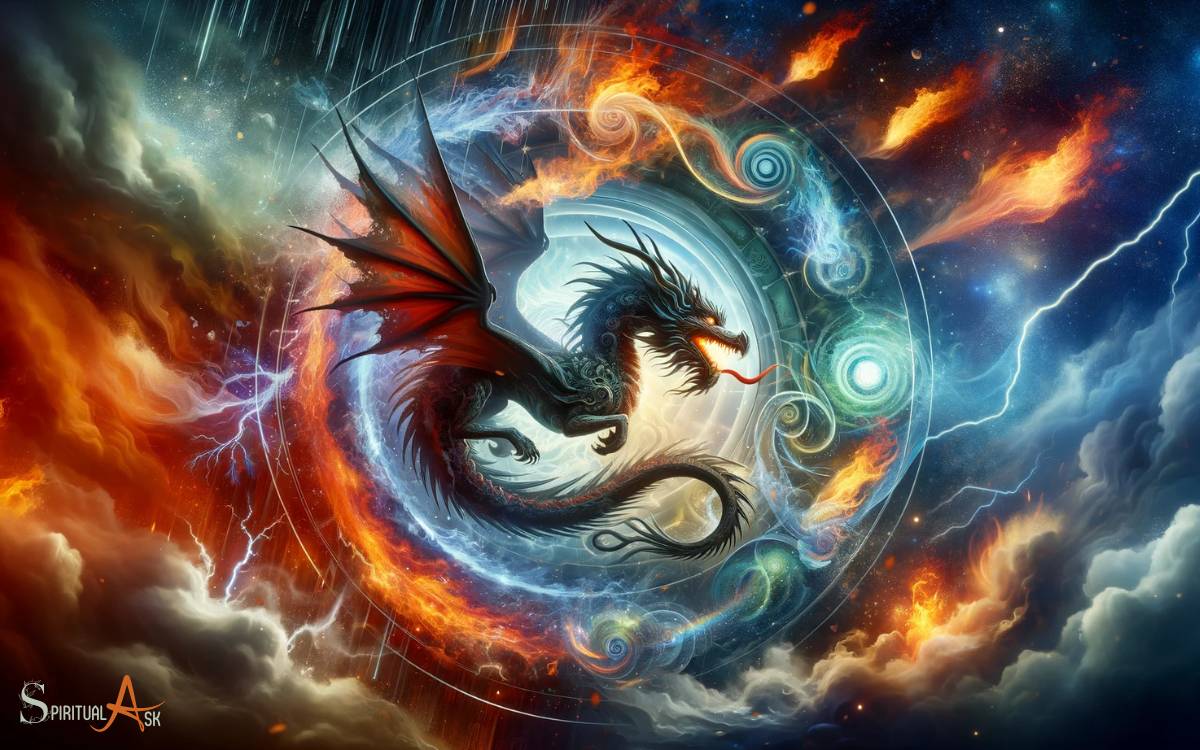
Here are a few reasons why dragons are seen as guardians and protectors:
- Defenders of Treasure: Dragons are often depicted as protectors of valuable treasures, representing their role as guardians of wealth and abundance.
- Wardens of Wisdom: In some traditions, dragons are revered as protectors of knowledge and wisdom, guiding seekers on their spiritual journey.
- Guardians of Boundaries: They are seen as protectors of sacred spaces, guarding the boundaries between the physical and spiritual realms.
- Symbols of Power: Dragons are believed to possess immense power, serving as protectors against malevolent forces.
- Defenders of the Vulnerable: In various myths, dragons are portrayed as protectors of the weak and innocent, symbolizing their role as guardians of the downtrodden and vulnerable.
Dragons as Agents of Transformation
As I delve into the spiritual symbolism of dragons, I find myself drawn to their role as catalysts for personal and spiritual transformation. In many cultures, dragons are seen as powerful beings that bring about change and growth.
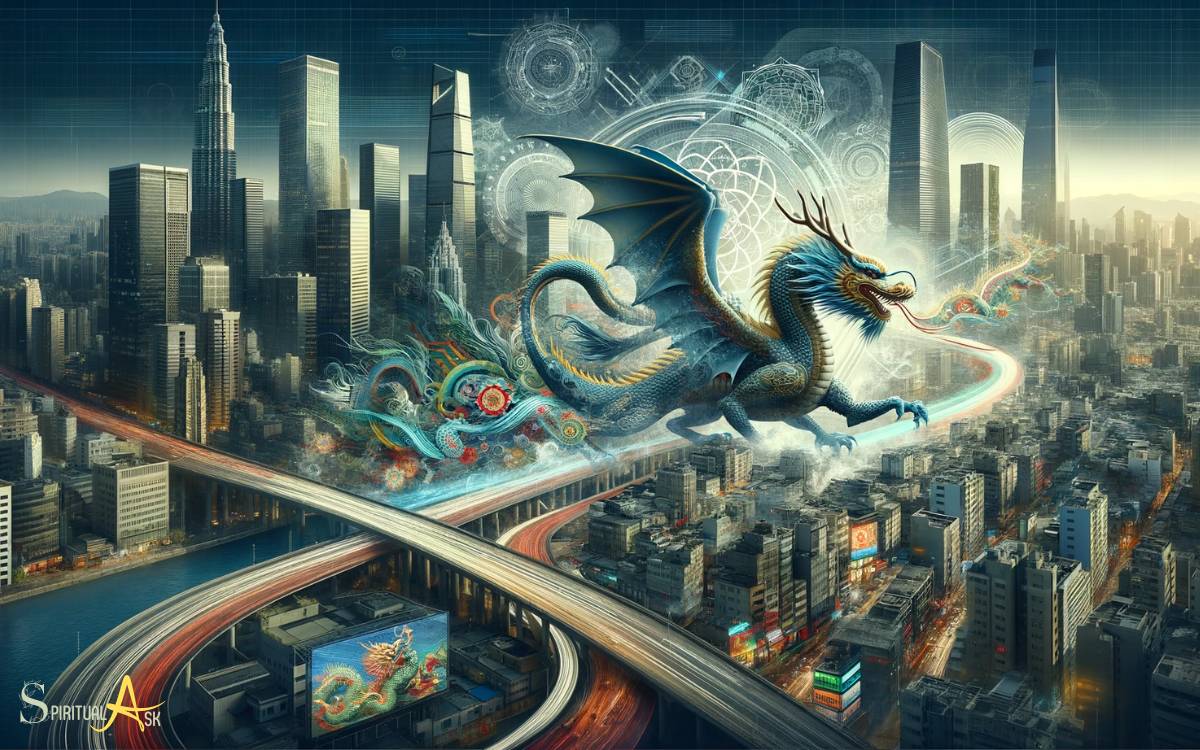
Their association with wisdom, strength, and ancient knowledge positions them as agents of profound transformation. The image of a dragon often represents the inner journey towards self-discovery, courage, and enlightenment.
In Eastern traditions, dragons are revered for their ability to bring about change and renewal, symbolizing the shedding of old ways to make room for new beginnings.
Embracing the energy of the dragon can inspire individuals to confront their fears, overcome obstacles, and emerge transformed.
By understanding the spiritual significance of dragons as agents of transformation, one can harness their symbolic power to facilitate personal growth and spiritual evolution.
The Modern Interpretation of Dragon Symbolism
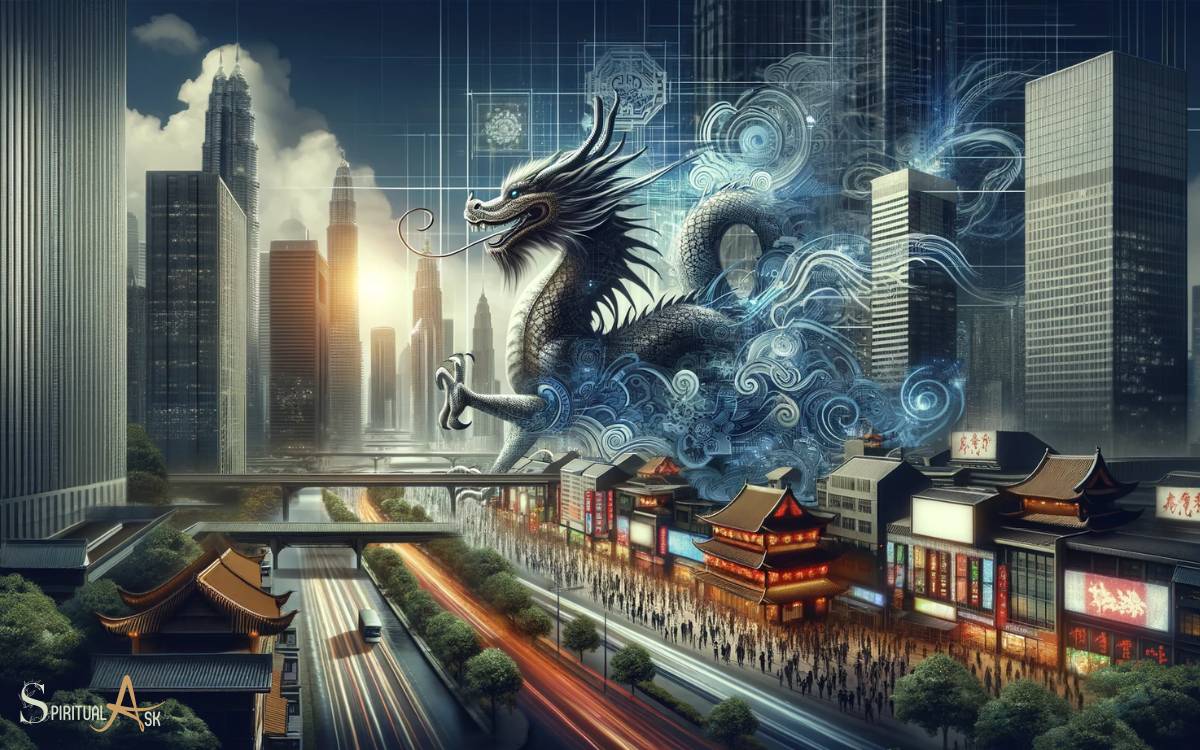
Having explored the traditional symbolism of dragons as agents of transformation, I now examine the modern interpretation of dragon symbolism, shedding light on its relevance in today’s spiritual context.
- Inner Strength: Dragons symbolize the inner strength and courage needed to face life’s challenges.
- Balance: They represent the balance between power and wisdom, encouraging us to find harmony in our lives.
- Protection: Modern interpretations view dragons as protectors, guarding against negative energies and providing a sense of security.
- Adaptability: Dragons are seen as symbols of adaptability and resilience, reminding us to embrace change and grow from it.
- Spiritual Growth: They serve as a reminder of the potential for spiritual growth and the journey towards enlightenment.
Today, dragon symbolism continues to inspire individuals to overcome obstacles, seek balance, and pursue spiritual evolution.
Conclusion
The symbolism of dragons spiritually is as vast as the sky itself. Their ancient origins, Eastern and Western traditions, and alchemical significance all point to their powerful and transformative nature.
They are not just mythical creatures, but guardians of wisdom and agents of profound change. The depth of their symbolism is as boundless as the ocean, and their spiritual significance will continue to captivate and inspire humanity for generations to come.






